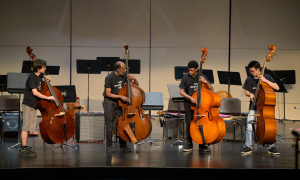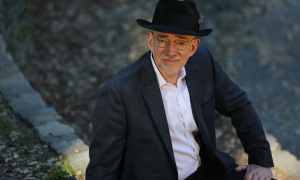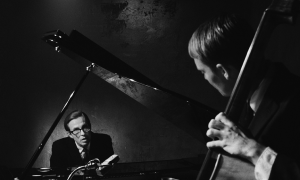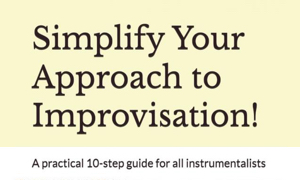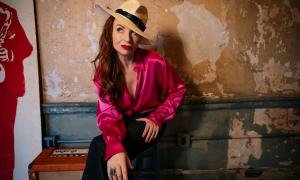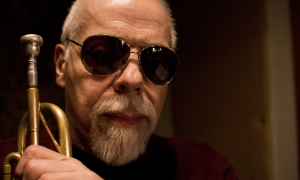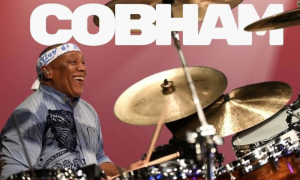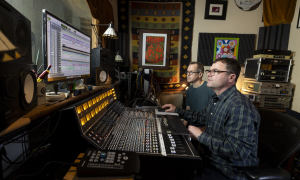This week Riverwalk Jazz presents Harry “Sweets" Edison in an encore presentation captured live at The Landing in San Antonio with The Jim Cullum Jazz Band. Edison died in 1999 at the age of 83.
The program is distributed in the US by Public Radio International. You can also drop in on a continuous stream of shows at the Stanford Archive of Recorded Sound.
Talking about his family background at The Landing in 1993, Harry "Sweets" Edison said “Schultz doesn’t sound like a black family name but my mother was a Schultz, and there were so many Schultzes in one little town in Kentucky that it became known as Schultztown.” His father, a Zuni Indian, and his mother separated when Harry Edison was a baby.
Growing up with his aunt and uncle on a farm near Beaver Dam, Kentucky, young Harry Edison weeded the garden, watered the horses and delivered newspapers on horseback. His uncle taught him the rudiments of music and insisted that he play the family pump organ every day. His uncle organized a band and traveled the countryside playing Sousa marches at church fairs and picnics.
One day Harry discovered that his uncle had a banged-up old York cornet, and he was fascinated with the instrument. Harry got the valves working, ordered a new mouthpiece by mail, and with his uncle’s help, began to play his first horn.
At eight years old, Harry was too young to be allowed in, so he’d stand outside the local dance hall and listen to the music coming from a couple of banjos, a washboard, and a washtub bass. Soon, he was listening to records by blues singers like Blind Lemon Jefferson and Bessie Smith.
Then lightning struck. Harry was 12, listening to a Bessie Smith record, when he heard Louis Armstrong play trumpet for the first time. He fell in love with the sound. Harry knew he’d make the trumpet his life’s work.
Harry Edison was 23 years old when he joined The Count Basie Band right before Christmas in 1938. Like Billie Holiday, Harry’s nickname was given to him by Lester Young. Edison said, “Lester had a flare for giving a nickname, and it usually stuck. I was elated that a man as great as Lester Young nicknamed me, ‘Sweets.’ I love to eat anything sweet, it’s true, and I like to play with a sweet quality, but I never asked Lester why he gave me my name.”
Unlike other bands of the Swing Era, the Basie band didn’t rely on written arrangements. Edison explains how this approach made for a unique sound:
“The big bands had arrangements, like the great Duke Ellington, Tommy Dorsey, Jimmy Dorsey, Benny Goodman—all the bands had music. You would have eight bars to play a solo, then you had to sit down and play the written arrangement. But since we didn’t have any written music in the Basie Band, everybody played solos. I think that’s the reason why so many great soloists came out of The Count Basie Band. We weren’t good readers anyway, that included Count Basie, so we just had a ball.
“Every night we’d play tunes I never heard of before, and I would try to find a note, and never could find a note. I got sort of disturbed and I told Basie I was going to quit. He said, 'Well, you sound good.' I said, 'But there’s no written music and I want to learn how to read.' He said, 'Well, you sound wonderful. If you find a note tonight, play the same damn note every night.' I did, and that went on for about twenty years.”
Sweets Edison left the Basie Band in 1950 and began a new career that made him one of the most sought-after session musicians in the business, often working two or three sessions a day. He played on movie soundtracks, (Lady Sings the Blues, Houseboat), performed in television studio bands,(Hollywood Palace and Rosemary Clooney); and was the music director for Sanford & Son.
For a decade, Sweets worked with Frank Sinatra, becoming famous for his signature Harmon-muted trumpet commentary behind Sinatra’s recorded vocals. And he made hit records with stars Nat Cole, Ella Fitzgerald and others.
On his 1993 Riverwalk Jazz appearance, Edison spoke of the recording stars of his era: “You could always tell who was playing on a record because they all had their own sound. You would never mistake Billie Holliday or Nat Cole for anybody else. Louis Armstrong, Benny Goodman, all of them had their sound that could be recognized. All the musicians used to say they’d rather be the world’s worst originator thanthe world’s best imitator.”
The program is distributed in the US by Public Radio International. You can also drop in on a continuous stream of shows at the Stanford Archive of Recorded Sound.
Talking about his family background at The Landing in 1993, Harry "Sweets" Edison said “Schultz doesn’t sound like a black family name but my mother was a Schultz, and there were so many Schultzes in one little town in Kentucky that it became known as Schultztown.” His father, a Zuni Indian, and his mother separated when Harry Edison was a baby.
Growing up with his aunt and uncle on a farm near Beaver Dam, Kentucky, young Harry Edison weeded the garden, watered the horses and delivered newspapers on horseback. His uncle taught him the rudiments of music and insisted that he play the family pump organ every day. His uncle organized a band and traveled the countryside playing Sousa marches at church fairs and picnics.
One day Harry discovered that his uncle had a banged-up old York cornet, and he was fascinated with the instrument. Harry got the valves working, ordered a new mouthpiece by mail, and with his uncle’s help, began to play his first horn.
At eight years old, Harry was too young to be allowed in, so he’d stand outside the local dance hall and listen to the music coming from a couple of banjos, a washboard, and a washtub bass. Soon, he was listening to records by blues singers like Blind Lemon Jefferson and Bessie Smith.
Then lightning struck. Harry was 12, listening to a Bessie Smith record, when he heard Louis Armstrong play trumpet for the first time. He fell in love with the sound. Harry knew he’d make the trumpet his life’s work.
Harry Edison was 23 years old when he joined The Count Basie Band right before Christmas in 1938. Like Billie Holiday, Harry’s nickname was given to him by Lester Young. Edison said, “Lester had a flare for giving a nickname, and it usually stuck. I was elated that a man as great as Lester Young nicknamed me, ‘Sweets.’ I love to eat anything sweet, it’s true, and I like to play with a sweet quality, but I never asked Lester why he gave me my name.”
Unlike other bands of the Swing Era, the Basie band didn’t rely on written arrangements. Edison explains how this approach made for a unique sound:
“The big bands had arrangements, like the great Duke Ellington, Tommy Dorsey, Jimmy Dorsey, Benny Goodman—all the bands had music. You would have eight bars to play a solo, then you had to sit down and play the written arrangement. But since we didn’t have any written music in the Basie Band, everybody played solos. I think that’s the reason why so many great soloists came out of The Count Basie Band. We weren’t good readers anyway, that included Count Basie, so we just had a ball.
“Every night we’d play tunes I never heard of before, and I would try to find a note, and never could find a note. I got sort of disturbed and I told Basie I was going to quit. He said, 'Well, you sound good.' I said, 'But there’s no written music and I want to learn how to read.' He said, 'Well, you sound wonderful. If you find a note tonight, play the same damn note every night.' I did, and that went on for about twenty years.”
Sweets Edison left the Basie Band in 1950 and began a new career that made him one of the most sought-after session musicians in the business, often working two or three sessions a day. He played on movie soundtracks, (Lady Sings the Blues, Houseboat), performed in television studio bands,(Hollywood Palace and Rosemary Clooney); and was the music director for Sanford & Son.
For a decade, Sweets worked with Frank Sinatra, becoming famous for his signature Harmon-muted trumpet commentary behind Sinatra’s recorded vocals. And he made hit records with stars Nat Cole, Ella Fitzgerald and others.
On his 1993 Riverwalk Jazz appearance, Edison spoke of the recording stars of his era: “You could always tell who was playing on a record because they all had their own sound. You would never mistake Billie Holliday or Nat Cole for anybody else. Louis Armstrong, Benny Goodman, all of them had their sound that could be recognized. All the musicians used to say they’d rather be the world’s worst originator thanthe world’s best imitator.”







